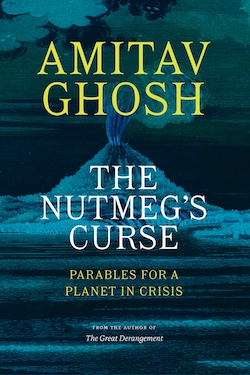SEJournal Online is the digital news magazine of the Society of Environmental Journalists. Learn more about SEJournal Online, including submission, subscription and advertising information.
BookShelf: How a Distant Chapter in Spice Trade Foretells Today’s Climate Chaos
“The Nutmeg’s Curse: Parables for a Planet in Crisis”
By Amitav Ghosh
University of Chicago Press, $25.00
Reviewed by Melody Kemp
 |
I admit to a long-standing love of author Amitav Ghosh’s work. Ghosh was born in India the year I migrated to Australia and his books litter my shelves with their incisive sharp humor, wisdom and narratives about parts of the world that have entranced me.
Still, it was something of an accomplishment that I managed to complete his new book, “The Nutmeg’s Curse: Parables for a Planet in Crisis.”
That was no fault of the book. It was because I was being medevacked to Australia with severe dengue fever.
The nutmeg part of the title refers to the Banda Islands in the Molucca Sea, one of the few places I did not get to while living in Indonesia, an oversight I have regretted and made all the stronger by reading this book.
Now, from the discomfort of my bed, I re-engaged with Ghosh’s skilled writing, complex analysis and appreciation of history and culture.
At its heart, the volume puts climate chaos into cultural and historical context, portraying the history of the nutmeg as one of conquest and exploitation — of both human life and the natural environment.
Search for wealth and power
The people of the Banda Islands were, over time, captured and enslaved, and their islands colonized by the Dutch and the Portuguese, a practice that continued for centuries.
How and why did we get there? Greed, arrogance and exploitation Ghosh would reply. Yes, we may know that, or at least think it in private.
His narrative style digs deeply into the history of
the search for wealth and power to the detriment
of others, using nutmeg and cloves as the exemplars.
But his narrative style digs deeply into the history of human insouciance, the search for wealth and power to the detriment of others, using nutmeg and cloves as the exemplars.
Now, as humans — well, at least Elon Musk — prepare to colonize space, Ghosh’s frameworks still hold true. He certainly brings to life the oft-spoken idea that “history repeats itself.”
But where did this start? What human behavior still dominates in our climate-damaging practices and why do they hold so much power?
Planet is plastic, human behavior is not
Most environmental writers focus on hard science — the more complex data the better. Credibility needs to be matched by figures, the logic goes.
Instead, Ghosh attempts to answer this question with a wonderful narrative of where we have been, both literally and figuratively.
If one were to reduce the book to one sentence, it would possibly be that while the planet is plastic, changing with circumstances inflicted upon it (increasingly to the detriment of its peoples), human behavior is not.
So we pursue greed and domination and the co-optation by the powerful, despite the planet’s response. As the saying goes: “We need the Earth but the Earth does not need us.”
Ghosh makes no bones about the role that the United States and its military-industrial structures and adjunct industries play as major leaders in climate destruction. Think of the neo-colonial aspects of lithium, rare earth materials, arable lands and, of course, oil and gas.
At its base, “The Nutmeg’s Curse: Parables for a Planet in Crisis” argues that the dynamics of climate change today are rooted in a centuries-old geopolitical order constructed by Western colonialism.
Without considering human propensities, we can do little but watch as the environmental debt accumulates.
BookShelf contributing editor Melody Kemp is a freelancer who has lived in and written from Asia for more than 30 years.
* From the weekly news magazine SEJournal Online, Vol. 7, No. 38. Content from each new issue of SEJournal Online is available to the public via the SEJournal Online main page. Subscribe to the e-newsletter here. And see past issues of the SEJournal archived here.










 Advertisement
Advertisement 


